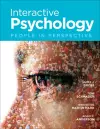
Interactive Psychology
4 authors - Digital product license key
£25.00
James J. Gross is Professor of Psychology at Stanford University and Director of the Stanford Psychophysiology Laboratory. Professor Gross's research focuses on emotion and emotion regulation processes in healthy and clinical populations. His 150 or so publications include The Handbook of Emotion Regulation (Guilford, 2007), and he has received early career awards from the American Psychological Association, the Western Psychological Association, and the Society for Psychophysiological Research. Professor Gross is also an award-winning teacher, a Bass University Fellow in Undergraduate Education, and the Director of the Stanford Psychology One Teaching Program. His teaching awards include Stanford's Dean's Award for Distinguished Teaching, the Stanford Phi Beta Kappa Teaching Prize, Stanford's Postdoctoral Mentoring Award, and Stanford's highest teaching prize, the Walter J. Gores Award for Excellence in Teaching. Toni Schmader holds the Canada Research Chair in Social Psychology at the University of British Columbia. She received her Ph.D. in social psychology from the University of California, Santa Barbara and was previously a faculty member at the University of Arizona. She has held visiting positions at Harvard University and Aix-Marseille University. She is the director of UBC’s Social Identity Laboratory (https://socialidentitylab.psych.ubc.ca/) and of a Canada-wide research consortium known as Engendering Success in STEM (successinSTEM.ca), aimed at evidence-based research to improve the representation of women in science and technology. Her research broadly examines how societal stereotypes and subtle biases constrain people’s thought, behavior, and performance. She has received awards for her teaching and mentoring of graduate students including the Dean’s Magellan Award for undergraduate teaching. She has served as an elected member of the executive boards of both the Society of Experimental Social Psychology and the Society of Personality and Social Psychology. She is the recipient of the Killam Research Prize and the Daniel M. Wegner Theoretical Innovation Award. Bridgette Martin Hard is an associate professor of the practice in psychology and neuroscience at Duke University. She earned her BS in psychology from Furman University, where she was inspired to study psychology by the late Charles Brewer, namesake of the American Psychological Foundation’s Charles L. Brewer Award for Distinguished Teaching. She received her Ph.D. in cognitive psychology from Stanford University. At Duke, she is the director of Undergraduate Studies for the psychology major, as well as director of the BRITElab: Behavioral Research Informing Teaching Excellence (https://sites.duke.edu/britelab/). Her research explores the intersection of psychology and pedagogy. She has focused intensely on teaching introductory psychology for the last decade, but also offers seminars in the teaching of psychology, pedagogical research, and applications of psychology to student success. She has won several teaching awards, including the Phi Beta Kappa Undergraduate Teaching Award and the Lloyd W. Dinkelspiel Award—Stanford University’s highest honor for contributions to undergraduate education. Dr. Hard is dedicated to supporting psychology teachers through continuing education opportunities. She is the founder and director of the Psychology One Conference, sponsored by the Society for the Teaching of Psychology. She also serves on the steering committee for the National Institute on the Teaching of Psychology. Adam K. Anderson is professor of human development and member of the graduate field of psychology at Cornell University. At different points in his career, he has found himself at Vassar, Harvard, City College NY, Yale, Stanford, and the University of Toronto. Born in Brooklyn and raised in Staten Island, he is happy to be teaching psychology and working with students back in his home state of NY. He is interested in the role of the emotions in all human faculties, considering psychological, physiological, and neural perspectives. A guiding principle in his research and teaching is that the function of emotions is to help rather than hurt us. In recognition of his work, Adam has been a Canada Research Chair in Cognitive Neuroscience and received the APA Early Career Award for Distinguished Scientific Contributions in cognitive and behavioral neuroscience, and the Cognitive Neuroscience Society Young Investigator Award. Beth Morling is Professor of Psychology at the University of?Delaware. She attended Carleton College in Northfield, Minnesota, and received her PhD from the University of Massachusetts at Amherst. Before coming to Delaware, she held positions at Union College (New York) and Muhlenberg College (Pennsylvania). In addition to teaching research methods at Delaware almost every semester, she also teaches undergraduate cultural psychology, a seminar on the self-concept, and a graduate course in the teaching of psychology. Her research in the area of cultural psychology explores how cultural practices shape people’s motivations. Dr. Morling has been a Fulbright scholar in Kyoto, Japan, and was the Delaware State Professor of the Year (2014), an award from the Council for Advancement and Support of Education (CASE) and the Carnegie Foundation for the Advancement of Teaching.